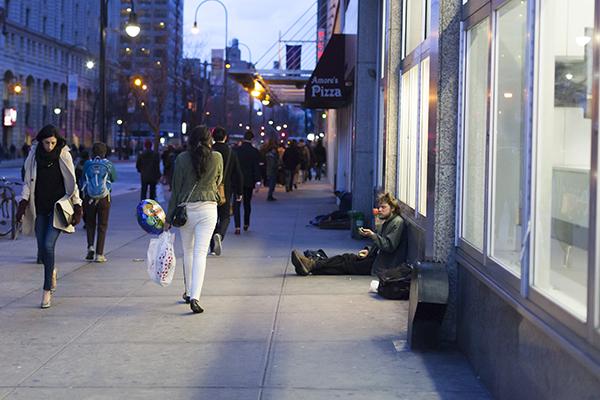De Blasio creates plan for housing to combat homelessness

On Nov. 18, Mayor de Blasio proposed a $2.6 billion plan to combat the homeless issue in NYC and to provide aid to those who need it.
November 23, 2015
Facing rising homelessness rates in New York City, Mayor Bill De Blasio announced a $2.6 billion plan to combat the problem on Wednesday. The plan is to create 15,000 supporting housing units in New York City where residents would pay one-third of their income toward rent and have on-site access to a network of professionals who assit them in overcoming the challenges that left them homeless.
On Wednesday, the mayor addressed a crowd at Times Square to discuss this city’s independent initiative amidst bureaucracy in Albany, New York.
“We are acting decisively,” De Blasio said. “We are not waiting on Albany.”
Currently, $620 billion dollars have already been allocated to the “Housing New York” affordable plan. Capital costs alone account for $1 billion and operational costs are an additional $96 million. The plan is expected to have a positive impact on some of the 58,000 individuals in the city’s shelter system.
Deborah K. Padgett, professor of social work and global health at NYU, noted that despite recent efforts to combat rising rates of homelessness, it is still a major issue in the city.
“While homelessness rates have gone down in many parts of the U.S. they have risen in New York and a few other cities,” Padgett said. “In these places, the situation is as visible and troubling as it was in the late 1980s. The big difference today is having a means of ‘ending’ instead of ‘managing’ homelessness.”
Public health experts like Simona Kwon, assistant professor at the NYU School of Medicine, are aware that a disparity exists between the health outcomes of the homeless population and those who are not homeless. Kwon said efforts to provide fair and equitable housing like De Blasio’s could have a significant impact on the existing health disparities.
She added that there is a critical need for working across the private and public sectors.
“In terms of sustainability, support and developing acceptable, accessible and appropriate housing, the mayor is going to have to build consensus and work in a coalition in partnership with government, health, private, public sectors and advocacy groups to have the impact needed,” Kwon said.
Critics of the mayor’s plan believe De Blasio is too close with the real estate developer community and is ill-informed about economics to realize that developers act in their own interest.
Scott Baker, community activist and president of Common Ground, criticized the proposed development strategy because it will drive up the cost of land in the city.
“Developers have become addicted to subsidies in the form of tax breaks and high borrowing costs that can only be alleviated by high selling costs,” Baker said.
To combat the problem, Baker suggested a higher tax for developers.
“The city would get all the revenues it needs, while developers, newly untaxed on their actual buildings, would rush to build or refurbish every square foot of inefficiently used land, providing housing and business opportunities for everyone,” Baker said.
A version of this article appeared in the Nov. 23 print edition. Email Tegan Mosugu at [email protected].


























































































































































